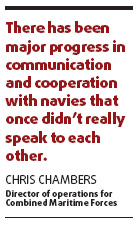Foreign and Military Affairs
Navies agree on 'set areas' for Somali patrols
By Zhang Haizhou (China Daily)
Updated: 2010-01-30 08:28
 |
Large Medium Small |
Navies in the waters off Somalia have agreed to adopt China's suggestion to patrol the area according to set areas of responsibility, a Chinese Ministry of Defense official said on Friday.
Beijing may also take the rotating chair of the multinational mission to patrol Somali waters, the official said on the phone.
The official also dismissed a report saying that China needed to send more warships to the region.
Beijing-based military analysts, however, downplayed the latest news on China's role in the waters, saying the United Nations should dominate the patrol mission and the rotating chair is that of a coordinator.
China first said that countries in the patrol mission should be given set areas in the ocean to take responsibility in the Gulf of Aden, but other countries, like the United States-led Combined Maritime Forces (CMF), initially urged vessels to use the IRTC only.
The IRTC is a stretch of sea along the Somali coast designed as a safer haven for vessels passing between the Gulf of Aden and the Indian Ocean.
The defense ministry official did not elaborate on when the new plan would start, but confirmed that China "may take the rotating chair" of the Shared Awareness and Deconfliction (SHADE) mechanism.
The official added that countries will need more discussions on the term's launch date and duration.
The Hong Kong-based South China Morning Post (SCMP) reported on Thursday that China last week had been handed the rotating leadership of SHADE, which has been jointly headed by European Union forces and the CMF.
It meant China needed "to send more than the three ships it keeps", the SCMP said.
But the defense ministry official denied this, saying the SCMP view was "inaccurate".

More than two years old, SHADE meets monthly to maximize coordination and communication among the 40-odd navies now protecting shipping off the Horn of Africa. The meeting last week was held in Bahrain.
While some nations operate as part of international flotillas under the banner of NATO, the EU or the CMF in the IRTC, some operate independently, including China, India, Russia, Malaysia and Iran.
Captain Chris Chambers, director of operations for the CMF, said China's new role is "a very positive development".
"There has been major progress in communication and cooperation with navies that once didn't really speak to each other," said the US naval officer.
The AFP reported that China has agreed to cooperate with a coalition of naval forces combating rampant piracy off the coast of Somalia, quoting a top Norwegian official.
"The Chinese delegate heralded this as a very important step forward. I absolutely agree with him. This will make the patrolling more efficient," said Carl Salicath, who chairs the Contact Group on Piracy off the Coast of Somalia.
Reuters quoted Captain Paul Chivers, chief of staff of the EU's naval operation off the coast of Somalia, as saying that China's participation in an international naval operation was "extremely good news".
He said it was not clear when China would be ready to assume its role as co-leader of the anti-piracy force.
But Chinese analysts downplayed China's role in the multinational operation.
"(Being the rotating chair) doesn't mean the right to lead others," said Yin Zhuo, an admiral and senior researcher at the navy's equipment research center.
Yin said SHADE is just "a coordination scheme based on member states' consultations", adding that the UN should be the general coordinator of the multinational mission.
Senior Colonel Li Jie, a researcher with the Chinese Navy's military academy, also said China is just a coordinator after taking the rotating leadership, though it means other countries have "recognized" Beijing's role in the patrol mission.
"China can learn some advanced experience from SHADE," Li said.
But he stressed the UN should still play the dominant role in the multinational mission, including the new plan to patrol the IRTC according to set areas of responsibility.
"It's just a start and still in the exploration stage," he said.
Liu Zhenmin, China's deputy permanent representative to the UN, first suggested that countries should patrol the Gulf of Aden according to set areas of responsibility in November last year to improve the efficiency of the mission.
Somali pirates were held responsible for 217 acts of piracy last year, during which 47 vessels, including one from the Chinese mainland, were hijacked and 867 crew members taken hostage. By the end of last year, Somali pirates allegedly held 12 vessels ransom and took 263 crew members of various nationalities hostage.











